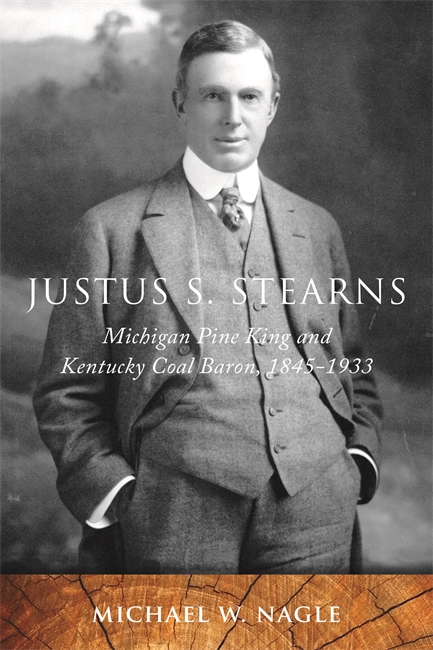Review

Justus S. Stearns: Michigan Pine King and Kentucky Coal Baron, 1845-1933. Image: Wayne State University Press
My recent trip to Ludington, Michigan’s Stearns Park Beach revealed the spoils of the state’s lumber legacy and a city revival led largely by late 19th century industrialist, Justus S. Stearns.
Ludington’s pristine Lake Michigan shore — a top-ranked beach — encouraged a dive into author Mike Nagle’s forthcoming release, Justus S. Stearns: Michigan Pine King and Kentucky Coal Baron, 1845-1933, which chronicles the business and philanthropic acumen of Michigan’s ‘Pine King.’
The biography is a window to the region’s entrepreneurial spirit, and it rides on Stearns’ monopoly-building foray.
A quick read, it felt like a guided walk through Ludington and the region’s hard-fought flight to industrialization.
Nagle argues that Stearns’ was a “man of the time, one of the many business entrepreneurs who pushed both Michigan and the United States into the industrial era.”
He navigates Stearns life with ease, manipulating time without losing clarity. Hopping back and forward, Nagle parades his knack for tuning descriptive anecdotes in each of the nine winding chapters.

Author, Mike Nagle. Image: Wayne State University Press
Stearns’ life led Nagle on a half-decade hunt across the country, where newspaper fragments and business records steered a story wrought with bankruptcy, union conflict and a pine-blackening fire.
Near the turn of the 20th century, the ‘Pine King’ led Michigan in lumber production and founded Stearns, Kentucky, a successful coal mining operation and another satellite to Stearns’ extractive empire.
It’s hard to forget the vast environmental impacts of resource consumption, not to mention the clear-cutting policies of the time. But Nagle alleviates this consumptive history with an emphasis on Stearns’ many gifts, including the region’s first hospital (now up for sale), and of course Stearns Park Beach.
Stearns delivered employment and opportunity in an era nearly defeated by the Depression. His philanthropy increased many regional residents’ access to education, electricity and medical care. In many cases he donated his own time and property.
However, his gifts didn’t extend to Wisconsin, where Stearns’ directed clear-cut operations on two Native American reservations, Nagle reports.
Here Stearns acquired a monopoly, constructing a sawmill on reservation land and employing the Native Americans living there. While initially profitable for them, the value of lumber increased but the price paid to them did not.
There was no long-term vision for Stearns, but “he’s not unique, he’s part of the pattern,” said Nagle.
That pattern is a lack of industrial foresight. Economic development beat out sustainability, and Native Americans were expected to farm the clear-cut land Stearns’ left behind.
His lumber and coal outfits were just the start. Stearns was involved in game board manufacturing, and he bought an electric company and hotel.
His shrewd business skills also led to a fairly successful run in Michigan politics where he served as Secretary of State and championed the political primary. A Republican and progressive (early 20th century type), Stearns supported the direct election of senators and the political primary.
His success peaked from 1895 to 1910. Stearns’ legacy lives on in Ludington, where almost a century has passed. Elsewhere, the remains of an absentee owner still draw historic criticism.
Available September 2015, Justus S. Stearns: Michigan Pine King and Kentucky Coal Baron, 1845-1933 is available for purchase ($39.99) as hardcover or e-book through Wayne State University Press.
Kevin Duffy is a reporter for Great Lakes Echo.
